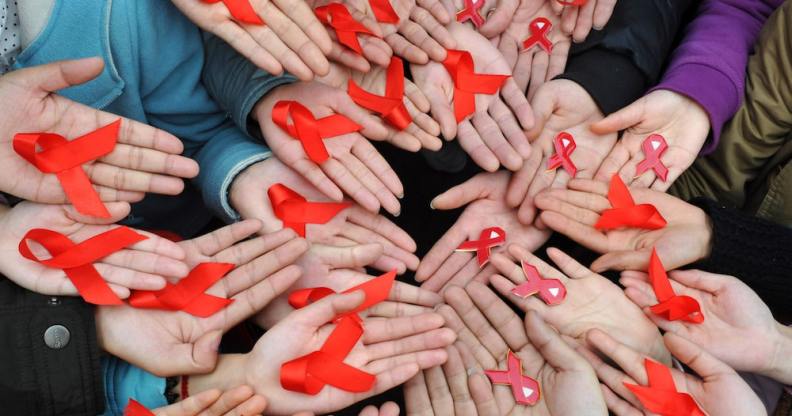Alarming number of people still think HIV can be transmitted through kissing, study finds

World AIDS day is recognised on 1 December. (Getty/ China Photos)
In 2021, almost a third of people still think that HIV can be transmitted through kissing, according to new research released for World AIDS Day.
The research was conducted by ViiV Healthcare, which develops new options for the care and treatment of people living with HIV and AIDS, as part of its HIV in View photography project in collaboration with Shutterstock, a free image gallery, portraying HIV-positive people “leading rich and rewarding lives”.
The data, showing that HIV stigma stubbornly persists, was based on a survey with more than 5,000 respondents in the UK, the US, Australia and Portugal.
Shockingly, it found that 30 per cent of respondents believe that HIV can be passed on through kissing, despite four decades having passed since the beginning of the AIDS crisis.
Although HIV positive people who take antiretroviral medication, like PrEP, can reduce the amount of the virus in their blood to undetectable level, 76 per cent of respondents were unaware that this means the virus is untransmittable.
A vast majority (88 per cent) also said they believe there are still negative perceptions towards people living with HIV.
Silvia Petretti, CEO of the HIV charity Positively UK, said in a statement: “Over the past four decades we’ve seen incredible progress in the HIV response yet, as this new survey clearly demonstrates, there are still many misconceptions around HIV.
“I am proud to have taken part in the HIV in View photography project, to show that people living with HIV can live fulfilling, healthy lives.
“I hope HIV in View helps people to understand the reality of living with HIV and removes HIV-related prejudice seen in the survey results.”
Viiv Healthcare CEO Deborah Waterhouse added: “The HIV community has made tremendous strides in tackling stigma and bias faced by people living with HIV, yet it is alarming to see the level of misunderstanding and inherent bias uncovered by this new survey.
“We often hear from the HIV community that interactions with friends, family, the general public and even healthcare providers sometimes feel fractured due to misinformation, misconceptions and the inherent bias held towards people living with HIV.
“Our hope is that through anti-stigma campaigns such as HIV in View, we can change the way the world views HIV so that one day, we can finally dismantle pervasive stigma for good.”
While the results of the World AIDS Day survey may seem unbelievable, those living with HIV will likely be unsurprised at the level and stigma and discrimination that remains despite advances in knowledge and care.
A US study released earlier this year found that less than half of Americans felt “knowledgable” about HIV, and more than half of non-LGBT+ respondents said they would be uncomfortable interacting with a medical professional who is living with HIV.
Last year, another study found that 59 per cent of Americans believe it is “important to be careful around people living with HIV to avoid catching it” and just 60 per cent of respondents were aware that HIV can be treated.

